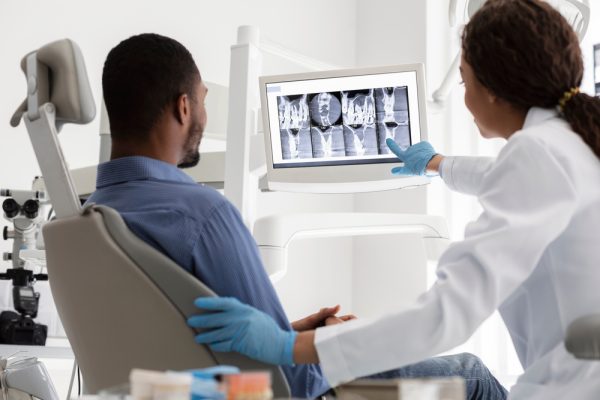Learn About the Benefits and Risks of Root Canal Therapy
Root canal therapy has become increasingly common, but is still surrounded by many myths and misconceptions. If you have an upcoming root canal treatment, our Wasilla, AK, dentist wants you to understand both the risks and benefits of root canal treatment so you can be prepared.
To schedule a consultation with our Alaska dental team, call (907) 373-2440 today.

Root Canal Treatment Benefits
Pain Relief
Root canal therapy can effectively relieve any toothaches and discomfort caused by infection or inflammation of the tooth pulp. Once complete, your source of pain will be gone.
Prevents Infection
When a tooth is damaged or infected, the bacteria can spread to other parts of the body. Root canal treatments remove the infected tissue and prevent the bacteria from spreading, which can protect your overall health.
Saves Your Natural Teeth
In the past, the only treatment for a damaged or infected tooth was extraction. Root canals allow you to keep your natural tooth, which is always the best option.
Restores Functionality
A damaged or infected tooth can make it difficult to eat or speak properly. Root canal therapy restores the functionality of the tooth, allowing you to eat, speak, and smile with confidence.
Preservation of Jawbone Degradation
Tooth loss can lead to the degradation of the jawbone over time. By saving the tooth through root canal therapy, you can prevent jawbone degradation.
Improves Overall Oral Health
Maintaining good oral health is essential for your overall health and well-being. Root canal therapy can help you maintain healthy teeth and gums, which can reduce your risk of other health problems.
Cost-Effective and Efficient
Root canal treatments are often less expensive and a more cost-effective option than extracting a tooth and then replacing it with a dental implant or a dental bridge. Root canal therapy also requires fewer visits than tooth replacements.

Risks of Root Canal Treatment
Like any medical procedure, root canal therapy carries some risks. While these risks are relatively rare, it’s essential to be aware of them before treatment.
Incomplete Removal of Infected Tissue
If the dentist doesn’t remove all of the infected tissue during root canal therapy, the infection can return. This can result in the need for additional treatment or even tooth extraction.
Damage to Surrounding Teeth
During root canal therapy, there may be accidental damage to the surrounding teeth or tissues. This can lead to additional dental problems that may require further treatment.
Discoloration of the Tooth
After root canal therapy, the treated tooth may become discolored. While this is a relatively minor side effect, it can be an aesthetic concern for some patients.
Weakening of the Tooth
After a root canal, the treated tooth may become weaker and more prone to fractures. This can sometimes be prevented by placing a dental crown on the tooth.
Overfilling or Underfilling
The filling material used to seal the clean root canal could be placed too far, causing irritation to the tissues at the end of the root (overfilling), or could be insufficient to fully seal the canal (underfilling), allowing bacteria to re-enter.
Tooth or Root Fracture
In rare instances, the process of cleaning and shaping the inner canals of a tooth can cause the tooth or its root to fracture, leading to potential complications.
Root Canal Treatment Alternatives
In some cases, root canal therapy may not be the best option for treating a damaged or infected tooth. Here are some alternatives to consider:
- Tooth Extraction: In cases where the tooth is severely damaged or infected, extraction may be the only option. While this may seem like a drastic measure, it can be necessary to prevent the spread of infection and protect your overall health.
- Antibiotics: Your dentist may prescribe antibiotics to treat an infected tooth. While this can help alleviate pain and reduce the infection, it’s not a long-term solution and may not be effective in all cases.
- Pulp Capping: Pulp capping is a procedure where a dental professional removes a small amount of damaged or decayed tooth material and places a protective covering over the exposed pulp. This allows the tooth to heal itself and can help avoid the need for a root canal.
- Apicoectomy: An apicoectomy is a surgical procedure performed when a root canal has failed or when there’s a persistent infection and involves removing the tip of the root and any infected tissue.
Frequently Asked Questions
Most patients can return to work or other activities immediately following a root canal. Avoid eating or drinking anything until the numbness from the anesthesia wears off to avoid accidentally biting or burning the tongue or cheek.
Antibiotics aren’t always a substitute for root canal therapy. While antibiotics can help manage infection, they can’t eliminate infection within the tooth. Root canal therapy is necessary to remove the infected tissue and restore the health of the tooth.
The success rate of root canal therapy is generally high, with studies showing a success rate of over 90 percent. However, the success of the procedure can depend on various factors, including the complexity of the case and the skill of the dentist performing the procedure.
Schedule Your Consultation at Northwind Dental
Root canal therapy can be a highly effective treatment option for those suffering from tooth decay or damage. While there are some risks associated with the procedure, the benefits of saving a natural tooth and avoiding more invasive treatments like tooth extraction are often well worth it.
To learn more, schedule a consultation with our dentist in Wasilla by contacting us today.
